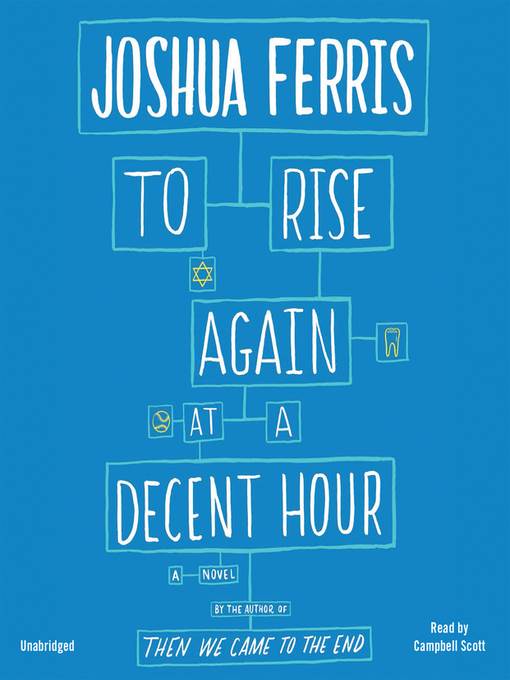
To Rise Again at a Decent Hour
A Novel
کتاب های مرتبط
- اطلاعات
- نقد و بررسی
- دیدگاه کاربران
نقد و بررسی

February 17, 2014
Paul O’Rourke, the main character of Ferris’s (Then We Came to the End) new book, is a dentist. And he’s a good one, informed and informative—even if the mouths that once seemed so erotic have devolved into caves of bacteria, pain, and lurking death. Ferris depicts Paul’s difficulties: in the workplace, he struggles to say good morning, has problems with the office manager (who’s also his ex-girlfriend), and likewise has problems with the devout Catholic hygienist, who can’t see why he doesn’t believe. A constant ruminator and obsessive Red Sox fan, Paul would like to believe and belong, but he can’t. And then the Ulms, who claim to be followers of Amalek (a figure from the Old Testament), hijack his Internet presence and claims him as their own. As an angry and incredulous Paul reads “his” tweets, learns about the unlikely history of the Ulms, and tries to figure out what it all means, readers may find themselves questioning whether the drama of the Ulms amounts to much. Paul is an appealing—albeit self-involved—everyman, but Ferris’s effort to take on big topics (existential doubt, grief, identity, the Internet, the lure and limits of religion, and the struggle to floss in the face of life’s meaninglessness) feels more like a set of thought experiments than an organic or character-driven story. Agent: Julie Barer, Barer Literary.

Narrator Campbell Scott's understated performance is a perfect match for the protagonist of this introspective novel. Manhattan dentist Paul O'Rourke is a bit of a misfit; his atheism and avoidance of social media are the least of his quirks. When his online identity is taken over by a fringe religious sect, he's forced to confront some of his deepest convictions. Scott's subtle inflections reflect O'Rourke's narrow emotional range, bringing listeners along as the dentist's initial discomfort at his stolen identity slowly morphs into curiosity about why he's become a target. While Scott's admirable narration can't bring unity to the book's disjointed conclusion, listeners will appreciate Scott's skill at transitioning between conversation, thoughts, and religious texts. C.B.L. © AudioFile 2014, Portland, Maine

Starred review from March 15, 2014
A bizarre case of identity theft forces a dentist to question his beliefs in this funny, thought-provoking return to form by Ferris (The Unnamed, 2010, etc.). In 2011, Paul O'Rourke has a thriving practice on Manhattan's Park Avenue and a throbbing sense that things could be a lot better. His nights are troubled by insomnia and a bed cooled by a recent breakup. His days feature patients who don't floss and three staffers--including his ex--who unsettle him in their own curious ways. As the novel opens, Paul's world quickly goes from bad to weird, and it's clear that Ferris is back in the riff-rich, seriocomic territory of his first novel, Then We Came to the End (2007). A confirmed atheist who sustains a ritualistic devotion to the Boston Red Sox, Paul's romances have exposed him to the tempting fervor and trappings of Catholicism and Judaism. Still, he resists fiercely when a website, a Facebook page and blogging comments mysteriously emerge in his name and he discovers that the man behind them fronts a quasi-Jewish sect founded on the value of doubt: "Behold, make thine heart hallowed by doubt; for God, if God, only God may know." With almost Pynchon-esque complexity, Ferris melds conspiracy and questions of faith in an entertaining way, although his irreverence and crudity in places may offend some readers. Full of life's rough edges, the book resists a neat conclusion, favoring instead a simple scene that is comic perfection--an ending far sweeter than the Red Sox had that year. Strangely astray in The Unnamed, Ferris is back on track here. Smart, sad, hilarious and eloquent, this shows a writer at the top of his game and surpassing the promise of his celebrated debut.
COPYRIGHT(2014) Kirkus Reviews, ALL RIGHTS RESERVED.

April 1, 2014
Ferris returns with his third novel, another dark comedy in the vein of his well-received debut, Then We Came to the End (2007). Paul O'Rourke is a Manhattan dentist so disillusioned with the world that he doesn't even like it when his favorite baseball team wins the World Series. More than anything else, he dislikes religion, other people, and the modern technology that forces him to interact with other people. He calls cell phones me-machines and nicknames one of his patients Contacts for texting during a procedure. That's why he and his staff are shocked when a website for their practice suddenly appears online. Soon after, a Facebook page pops up, followed by a Twitter profile, all impersonating Paul. Infuriated, he tracks down his imposter and uncovers a fringe religious sect that worships Amalek, the father of a biblical tribe destroyed by King David in a holy war. As he tries to recover his stolen identity, Paul begins to question who he really is. The protagonist's sharp inner dialogues are laugh-out-loud hilarious, combining Woody Allen's New York nihilism with an Ivy League vocabulary. The narrative occasionally stumbles and spins out in the novel's latter third, but Ferris' unique voice shines.(Reprinted with permission of Booklist, copyright 2014, American Library Association.)

December 1, 2013
This third novel from National Book Award finalist Ferris features Paul O'Rourke, a bundle of nervous contradictions who's shocked when someone starts impersonating him online. Worse, the online Paul looks to be better than the real thing.
Copyright 2013 Library Journal, LLC Used with permission.

























دیدگاه کاربران